- Home
- Paulo Coelho
Adultery Page 9
Adultery Read online
Page 9
Okay, I'm lost. I don't know what to answer, and the man can tell he's dealing with a novice. I've been tested and I didn't pass.
He laughs. I ask if he thinks I'm with the police.
"Of course not. The police would know immediately what I'm talking about."
I explain that it's my first time doing this.
"You can tell. A woman dressed like you would never bother coming down here. You could ask your nephew or a work colleague for leftovers from their personal stash. That's why I brought you to the edge of the lake. We could have done the deal as we walked, and then I wouldn't be wasting so much of my time. But I want to know exactly what you're looking for, and if you need advice."
He wasn't wasting his time; he must have been dying of boredom just standing around in that underpass. In the three times I walked past, there hadn't been a single interested customer.
"All right, I'll repeat in terms you might understand: hashish, amphetamines, LSD, or cocaine?"
I ask if he has crack or heroin. He says those drugs are banned. I want to tell him that the ones he mentioned are also banned, but I bite my tongue.
It's not for me, I explain. It's for an enemy.
"You mean revenge? You want to kill someone with an overdose? Please, lady, find somebody else."
He begins to walk away, but I stop him and plead for him to listen to me. I note that desperation has likely already doubled the price.
As far as I know, the person in question doesn't do drugs, I explain. But she has seriously harmed my romantic relationship. I just want to set a trap for her.
"That's going against the ethics of God."
Will you look at that? Someone who sells addictive and possibly deadly products is trying to put me on the right path!
I tell him my story. I've been married for ten years, I have two wonderful children. My husband and I have the same kind of smartphone, and two months ago I grabbed his by accident.
"You don't use a security code?"
Of course not. We trust each other. Or maybe his has one, but it was deactivated at that moment. What's important is I found around four hundred texts and several photos of an attractive blond woman who is well-off, by the looks of it. I did what I shouldn't have. I made a scene. I asked him who she was, and he didn't deny it--he said she was the woman he loved. He was glad that I had found out before he had to tell me.
"That happens very often."
The dealer has gone from pastor to marriage counselor! But I keep going--because I am getting excited about the story I'm telling as I invent it. I asked him to move out. He agreed, and the next day he left me with our two children to go live with the love of his life. But she didn't take very kindly to this plan, as she thought it much more fun to be in a relationship with a married man than to live with a husband she didn't choose.
"Women! It's impossible to understand you!"
I think so, too. I continue my story: She said she wasn't ready to live with him and broke it off. As I imagine often happens, he came home begging for forgiveness. I forgave him. I actually wanted him to return. I'm a romantic woman, and I wouldn't know how to live without the person I love.
But now, after only a few weeks, I've noticed he's changed again. He's no longer foolish enough to leave his phone lying around, so there's no way to find out if they're back together. But I suspect they are. And the woman--that blond, independent executive, irresistibly charming and powerful--is taking what's most important in my life: love. Does he know what love is?
"I understand what you want, but it's really dangerous."
How can he understand if I haven't finished explaining?
"You want to set a trap for this woman, but we don't have the kind of merchandise you're asking for. To carry out your plan, you would need at least thirty grams of cocaine."
He grabs his smartphone, pulls up something, and shows it to me. It's a page from CNN's Money site detailing the price of drugs. I'm surprised, but discover it's a recent report on the difficulties facing the major cartels.
"As you can see, you'll need to spend five thousand Swiss francs. Is it worth it? Wouldn't it be cheaper to go over to this woman's house and make a fuss? Besides, from what I understand, she might not be guilty of anything."
He had gone from pastor to marriage counselor. And now, from marriage counselor, he's turned into a financial adviser, trying to keep me from needlessly spending my money.
I say I accept the risk. I know I'm right. But why thirty grams and not ten?
"It's the minimum amount to frame a person as a drug dealer. The penalty is much heavier than the one for users. Are you sure you want to do this? Because you could be arrested on the way to your house, or to that woman's house, and you'd have no way of explaining why the drugs are in your possession."
Are all drug dealers like this, or did I just fall into the hands of someone special? I'd love to spend hours chatting with this man. He's so experienced and knowledgeable. But apparently, he's very busy. He asks me to return in half an hour with the money in cash. I go to an ATM, surprised at my own naivete. Of course drug dealers don't carry large quantities. Otherwise they'd be considered drug dealers!
I return and he is waiting. I hand over the money discreetly and he points to a trash can.
"Please don't leave the goods somewhere where the woman can find it, because she might get confused and wind up ingesting it. That would be a disaster."
This man is one of a kind; he thinks of everything. If he were the CEO of a multinational, he'd be earning a fortune in shareholder bonuses.
I think about continuing the conversation, but he's already walked away. I look back at the trash can. What if there's nothing there? But no, these men have a reputation to uphold and wouldn't do something like that.
Looking around, I walk over and grab the manila envelope inside, putting it in my bag and immediately taking a taxi to the newspaper offices. I'm going to be late again.
I paid a fortune for something that weighs almost nothing.
But how do I know that man didn't trick me? I need to find out for myself.
I rent two or three movies whose main characters are addicts. My husband is surprised by my new interest.
"You're not thinking of doing that, are you?"
Of course not! It's just research for the newspaper. By the way, I'll be home late tomorrow. I've decided to write an article about Lord Byron's castle and I need to stop by there. You needn't worry.
"I'm not worried. I think things have improved a lot since we spent that day in Nyon. We need to travel more, maybe at New Year's Eve. Next time we'll leave the children with my mother. I've been talking with people who understand this kind of thing."
The "thing" must be what he considers my depression. Who exactly have you been talking to? Some friend who will spill the beans the first time he has a little too much to drink?
"No, not at all. A marriage counselor."
How awful! Marriage counseling was the last thing I heard that terrible afternoon at the golf club. Have the two of them been talking behind my back?
"Maybe I caused your problem. I don't give you the attention you deserve. I'm always talking about work, or things we need to do. We've lost the romance needed to maintain a happy family. Caring about the children isn't enough. We need more than that while we're still young. Who knows, maybe we can revisit Interlaken, the first trip we took together after we met? We can climb part of the Jungfrau and enjoy the scenery from above."
A marriage counselor! That's all I need.
The conversation with my husband reminds me of an old saying: there is none so blind as the one who does not want to see.
How could he think he'd forsaken me? Where did he get such a crazy idea? It's not as if I'm welcoming him to bed with open arms and legs.
It has been a while since we had an intense sexual relationship. In a healthy relationship, this is even more important for a couple's stability than making plans for the future or talking about the chil
dren. Interlaken takes me back to a time when we strolled around the city in the late afternoon--because the rest of the time we were locked up in the hotel, making love and drinking cheap wine.
When we love someone, we're not satisfied with knowing only the person's soul--we also want to understand the person's body. Is it necessary? I don't know, but instinct encourages us. There is no set time for it to take place, no rules to follow. Nothing beats that moment of revelation when shyness loses ground to boldness, and quiet moans turn into squeals and swearing. Yes, swearing--I have an overwhelming need to hear forbidden and "dirty" things when I've got a man inside me.
In these moments, the same old questions arise: "Am I squeezing too hard?" "Should I go faster or slower?" These questions might seem out of place or bothersome, but they are part of this act of initiation, understanding, and mutual respect. It is very important to talk while building a perfect intimacy. The opposite would mean silent and dishonest frustration.
Then comes marriage. We try to maintain the same behaviors, and sometimes we succeed--in my case, it lasted until I got pregnant the first time, which happened quickly. Until suddenly we realize that things have changed.
Sex, from now on, is only at night and preferably just before bedtime. As if it were an obligation, both parties accept without questioning whether the other is in the mood. If sex is skipped, suspicions arise, so it's best to stick to the ritual.
If it wasn't good, don't say anything, because tomorrow may be better. After all, we're married. We have our whole lives ahead of us.
There is nothing else to discover, and we try to get as much pleasure as possible from the same things. This is like eating chocolate every day, without changing brands or trying new flavors: it's not a sacrifice, but isn't there anything else?
Of course there is: little toys you can buy at sex shops, swinger clubs, inviting a third person to join, or taking adventurous chances at parties hosted by unconventional friends.
To me, this is all very risky. We don't know what the consequences will be--it's better to leave things alone.
And so the days go by. We discover by talking with friends that the so-called simultaneous orgasm--where a couple becomes aroused at the same time, caressing the same parts and moaning in unison--is a myth. How can I have pleasure if I have to be paying attention to what I'm doing? Touch my body, drive me wild, and then I'll do the same to you--that would be more natural.
But most of the time that's not how it is. The communion has to be "perfect," or, in other words, nonexistent.
And careful with the moaning, so as not to wake the children.
Ah, I'm glad that's over, I was so tired and don't know how I managed. You're the best! Good night.
Until the day when one of the two realizes they need a break from the routine. But instead of going to swinger clubs, or sex shops full of gadgets we can't even figure out how to work properly, or to the home of wild friends who keep discovering new things, we decide to ... spend some time without the children.
Plan a romantic getaway. With no surprises. Where everything will be absolutely, utterly planned and organized.
And we think this a great idea.
I create a fake e-mail account. I have the drugs, duly tested (followed by my vow never to do that again, because it felt great).
I know how to enter the university without being seen and plant the evidence in Marianne's desk. All I have to do is determine which drawer she won't be opening anytime soon, which is the riskiest part of my plan. But that's what the drug dealer suggested, and I should listen to the voice of experience.
I can't ask a student for help. I'll have to do it on my own. But other than this, I've got nothing else to do but nurture my husband's "romantic dream" and bombard Jacob's phone with my messages of love and hope.
The conversation with the drug dealer gave me an idea, which I put into practice: every day I send text messages of love and encouragement. This can work in two ways. The first is that Jacob will realize he has my support and that I'm not the least bit upset about our meeting at the golf club. The second, should the first fail, is if Mme Konig one day goes to the trouble of rummaging through her husband's phone.
I go online, copy something that seems intelligent, and press "send."
Since the election, nothing important has happened in Geneva. Jacob is no longer quoted in the press, and I have no idea what is happening with him. Only one thing has mobilized public opinion lately: whether or not the city should cancel the New Year's Eve party.
According to some deputies, the expense is "exorbitant." I was in charge of finding out exactly what that meant. I went to city hall and uncovered the amount: 115,000 Swiss francs, or what two people--me, and the colleague who works beside me, for example--pay in taxes.
In other words, with the tax money from two citizens who earn a reasonable but not extraordinary salary, they could make thousands of people happy. But no. We must save our money, because no one knows what the future has in store. Meanwhile, the city's coffers fill. We might run out of salt to dump on the streets this winter to keep the snow from turning into ice and causing accidents, or the sidewalks are always in need of repair. Everywhere you look there is roadwork and construction that no one can explain.
Happiness can wait. What's important is "keeping up appearances," which really means "don't let anyone realize that we are extremely wealthy."
I have to wake up early tomorrow and get to work. The fact that Jacob has ignored my messages has brought me closer to my husband. Yet I still intend to exact some revenge.
True, I have almost no desire to go through with it now, but I hate to abandon my plans halfway. Living is making decisions and dealing with the consequences. I haven't done that in a long time, and perhaps that's one of the reasons I'm lying here in the middle of the night and staring at the ceiling again.
Sending messages to a man who rejects me is a waste of time and money. I no longer care about his happiness. Actually, I want him to be really unhappy, because I offered him the best part of me and he suggested I try marriage counseling.
And because of that, I must put that witch in jail, even if my soul lingers in purgatory for centuries.
I must? Where did that come from? I'm tired, so tired, and I can't sleep.
"Married Women More Likely to Suffer from Depression than Single Women," claimed an article published in today's newspaper.
I didn't read it. But this year is turning out to be very, very strange.
When I was a teenager, everything in my life went exactly as I planned. I was happy ... but now something has happened.
It's like a virus has infected the computer. The destruction has begun, slow but relentless. Everything is slowing down. Some large programs now require a lot of memory to open. Certain files--photos, documents--have disappeared without a trace.
We looked for the reason but found nothing. We asked friends who know more about these things, but they are unable to detect the problem, either. The computer is becoming empty, sluggish, and it is no longer ours. The undetectable virus now owns it. Sure, we can always switch to a new machine, but what about the things stored there, the things that took so many years to put in order? Are they lost forever?
It's not fair.
I don't have the slightest control over what is happening. My absurd infatuation with a man who, by now, must think he's being harassed. My marriage to a man who seems close, but who never shows his weaknesses and vulnerabilities. The desire to destroy someone I met only once, on the pretext that it will do away with my inner ghosts.
A lot of people say time heals all wounds, but that isn't true.
Apparently, time heals only the good things that we wish to hold on to forever. Time tells us, "Don't be fooled, this is reality." That's why the things I read to lift my spirits don't stay with me for very long. There is a hole in my soul that drains me of all positive energy, leaving behind only emptiness. I know the hole well--I have lived with it for months--but I do
n't know how to escape its hold over me.
Jacob thinks I need marriage counseling. My boss considers me an excellent journalist. My children notice a change in my behavior, but ask nothing. My husband understood what I was feeling only after we went to a restaurant and I tried to open my soul to him.
I take the iPad from the nightstand. I multiply 365 by 70. The answer is 25,550. That's the average number of days a normal person lives. How many have I already wasted?
People around me always complain about everything. "I work eight hours a day, and if I get promoted, I'll be working twelve." "Ever since I got married, I don't have any time for myself." "I searched for God and now I have to go to church services, Mass, and religious ceremonies."
Everything we seek so enthusiastically before we reach adulthood--love, work, faith--turns into a burden too heavy to bear.
There is only one way to escape this: love. To love is to transform slavery into freedom.
But right now, I can't love. I just feel hate.
And as absurd as this might sound, it gives meaning to my days.
I ARRIVE at the building where Marianne teaches her philosophy classes--an annex that, to my surprise, is located on one of the University Hospital of Geneva's campuses. Then I begin to wonder: Could this prized course on her CV be nothing more than an extracurricular with absolutely no academic weight?
Having parked the car at a supermarket, I walked about half a mile to get to this jumble of low buildings that sit in a beautiful green field with a little lake in the middle. Arrows indicate directions. Over there are institutions that, seemingly disconnected, are complementary if you stop to think about it: the hospital ward for the elderly and a mental hospital. The latter is in a beautiful building from the early twentieth century where psychiatrists, nurses, psychologists, and psychotherapists from all over Europe graduate.
I walk by something that, strangely, looks like the beacons one finds at the end of an airport runway. I have to read the sign beside it to figure out what it is. It's a sculpture called Passage 2000, a "visual song" comprising ten bars from railway crossings, all equipped with red lights. I wonder if the person who made it was one of the patients, but I discover when I keep reading that the work is by a famous sculptor. Let's respect art, but don't give me this about artists being normal.

 The Alchemist
The Alchemist Maktub
Maktub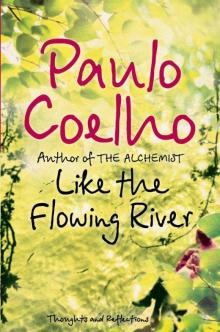 Like the Flowing River
Like the Flowing River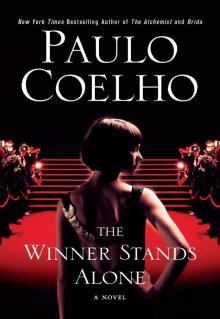 The Winner Stands Alone
The Winner Stands Alone The Spy
The Spy By the River Piedra I Sat Down and Wept: A Novel of Forgiveness
By the River Piedra I Sat Down and Wept: A Novel of Forgiveness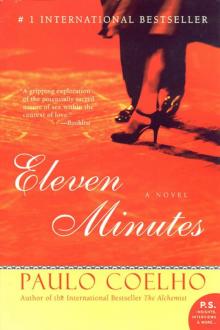 Eleven Minutes
Eleven Minutes Manuscript Found in Accra
Manuscript Found in Accra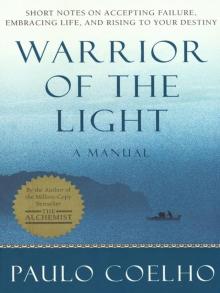 Warrior of the Light
Warrior of the Light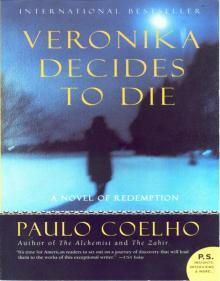 Veronika Decides to Die: A Novel of Redemption
Veronika Decides to Die: A Novel of Redemption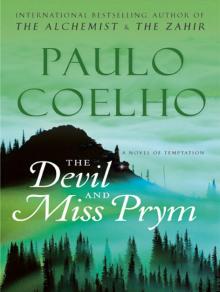 The Devil and Miss Prym: A Novel of Temptation
The Devil and Miss Prym: A Novel of Temptation The Valkyries: An Encounter With Angels
The Valkyries: An Encounter With Angels Brida: A Novel
Brida: A Novel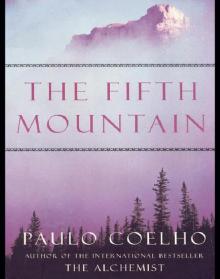 Fifth Mountain: A Novel
Fifth Mountain: A Novel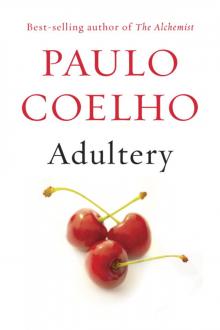 Adultery
Adultery Inspirations
Inspirations The Archer
The Archer The Witch of Portobello
The Witch of Portobello The Pilgrimage
The Pilgrimage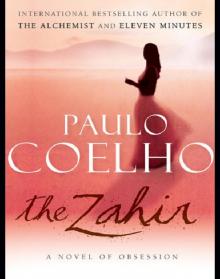 The Zahir
The Zahir Brida
Brida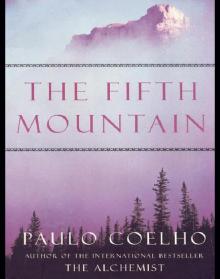 The Fifth Mountain
The Fifth Mountain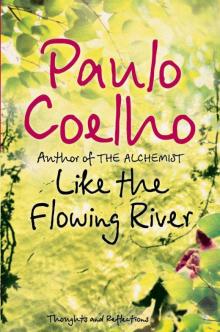 Like the Flowing River: Thoughts and Reflections
Like the Flowing River: Thoughts and Reflections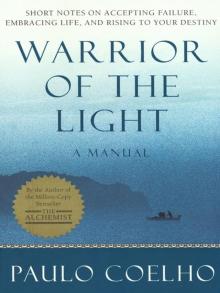 Manual of the Warrior of Light
Manual of the Warrior of Light By The River Piedra I Sat Down & Wept
By The River Piedra I Sat Down & Wept The Supreme Gift
The Supreme Gift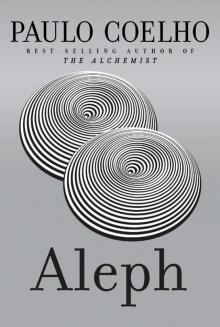 Aleph
Aleph Hippie
Hippie Witch of Portobello
Witch of Portobello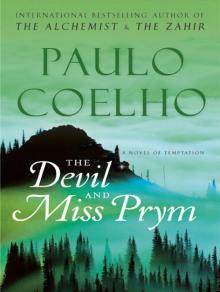 The Devil and Miss Prym
The Devil and Miss Prym The Alchemist - 10th Anniversary Edition
The Alchemist - 10th Anniversary Edition The Valkyries
The Valkyries